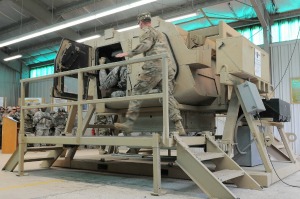Multinational forces make preparations for communications and safe operations
Story by: Sgt. Adrian Shelton
Posted: June 8, 2016
 Photo By Sgt. Adrian Shelton | An instructor rushes to assist Soldiers in exiting a simulated rolled over vehicle during HMMWV Egress Assistance Training (HEAT) at the Observer Coach Trainer Academy, at Operation Swift Response at JMRC, Hohenfels Training Area in southeastern Germany, June 10, 2016. HEAT teaches Soldiers how to react and survive in the event of a vehicle rollover event. Exercise Swift Response is one of the premier military crisis response training events for multi-national airborne forces in the world. The exercise is designed to enhance the readiness of the combat core of the U.S. Global Response Force -- currently the 82nd Airborne Division's 1st Brigade Combat Team -- to conduct rapid response, joint-forcible entry and follow-on operations alongside Allied high-readiness forces in Europe. Swift Response 16 includes more than 5,000 Soldiers and Airmen from Belgium, France, Germany, Great Britain, Italy, the Netherlands, Poland, Portugal, Spain and the United states and takes place in Poland and Germany, May 27-June 26, 2016. (Photo by U.S. Army National Guard Sgt. Adrian Shelton)
Photo By Sgt. Adrian Shelton | An instructor rushes to assist Soldiers in exiting a simulated rolled over vehicle during HMMWV Egress Assistance Training (HEAT) at the Observer Coach Trainer Academy, at Operation Swift Response at JMRC, Hohenfels Training Area in southeastern Germany, June 10, 2016. HEAT teaches Soldiers how to react and survive in the event of a vehicle rollover event. Exercise Swift Response is one of the premier military crisis response training events for multi-national airborne forces in the world. The exercise is designed to enhance the readiness of the combat core of the U.S. Global Response Force -- currently the 82nd Airborne Division's 1st Brigade Combat Team -- to conduct rapid response, joint-forcible entry and follow-on operations alongside Allied high-readiness forces in Europe. Swift Response 16 includes more than 5,000 Soldiers and Airmen from Belgium, France, Germany, Great Britain, Italy, the Netherlands, Poland, Portugal, Spain and the United states and takes place in Poland and Germany, May 27-June 26, 2016. (Photo by U.S. Army National Guard Sgt. Adrian Shelton)
Joint Multinational Readiness Center (JMRC), US Army Garrison, Hohenfels, Germany - Service members from the Army active duty component, National Guard and Reserves, and US Army Europe, prepared for their roles in Swift Response 16 by attending observer/controller training here alongside multinational forces on Wednesday, June 8, 2016.
Swift Response is a two-phased, premier military crisis response training event; it involves a multinational task force whose primary purpose is to evaluate and enhance the forces' readiness to rapidly deploy in response to conflicts anywhere in the world within less than 24 hours. The first phase began May 27 in Poland, during which paratroopers of several nations conducted multiple and simultaneous airborne jumps to demonstrate allied rapid response capabilities.
"Learning how to work together with the multinational members from all around NATO and the Unified Europe (UE) forces creates some difficult challenges," said Army Sgt. 1st Class Michael P. Perez, commandant of the Observer Coach Trainer Academy. "One of the biggest challenges is learning languages and having to work through the language barriers, having to use linguists to help facilitate the information critically that needs to get across to everybody."
During Swift Response's second phase, the OC-T teams gather at JMRC, during which the teams provide coaching, teaching, mentoring and after action reviews (AAR) to military units that are part of NATO. A primary focus for them, other than exercising control and adjudication of instrumentation systems, is assisting the chain of command in enforcing safety and mitigating risk. Their initial training involves pyrotechnics safety and what is known as HMMWV egress assistance training (HEAT) that teaches Soldiers the effects of rollover incidents and the skills to react and survive such incidents should they occur.
"The units give us what they want to train on, and whatever the training plan they have is our indicators that they're succeeding at the mission they're on," said Army Capt. Joshua A. Wright, 1st Battalion, 141st Infantry Brigade, San Antonio, Texas. He is also the mobilization officer in charge for Texas Army National Guard. Wright said that OC's ensure the units maneuver safely and that their actions are documented in order for units to maximize the quality of their training at JMRC.
One of America's allies, France, sent members of a newly established joint airborne brigade in the city of Marseille, to JMRC to learn ways to observe and coach their unit's training. They presented the challenge of language barriers but how that can be overcome during the integration efforts during an exercise such as Swift Response.
"The first thing we have to learn is to speak English," said French Army Maj. Fabrice Vasseur. "It is sometimes very difficult for us. Like Americans, French have many different accents and sometimes for us for example on the radios, there is misunderstanding, so it is important for us to hear people speaking."
The OC's agree that communications is their biggest challenge. The host nation for Swift Response 16, Germany, identifies its location as a key strength that enhances overall multinational operability.
"To all the nations that are not here, take a chance and join us," said German Army Capt. Sascha Duderstaedt, 3rd Company, 31st Airborne Regiment, also known as German Ranger Company, in Seedorf. "It's a great opportunity, especially how much effort and money the U.S. put in here, and to train here in the environment that is international, that is challenging, and hopefully more nations from the NATO side will join us here at Swift Response to get better within the NATO."
This year marks the 16th rotation of Operation Swift Response, and will conclude on June 26.